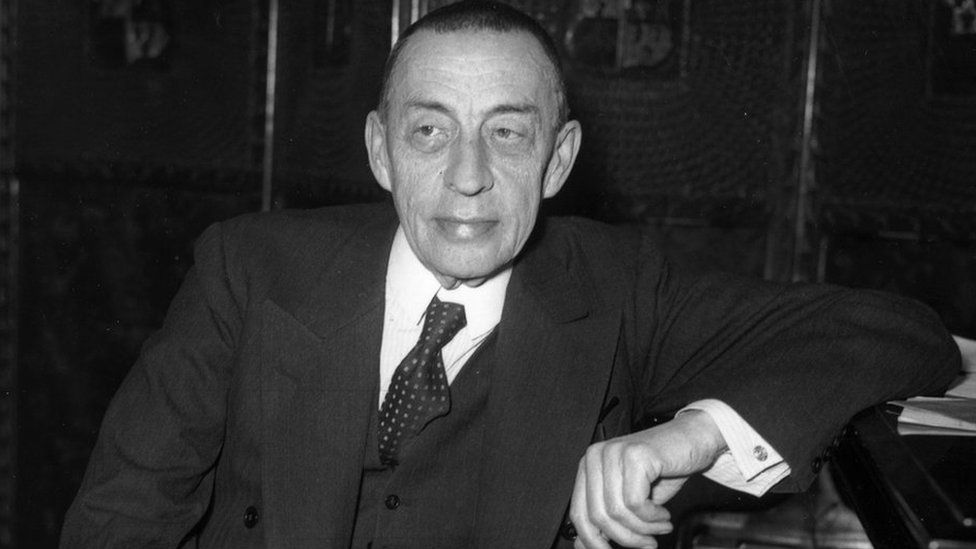Why Sergei Rachmaninoff continues to enthral
- Published

Ahead of a BBC Four tribute to composer Sergei Rachmaninoff, a BBC music journalist explains why his music continues to enthral and seduce.
I know how Marilyn Monroe feels. Or at least, the fantastical version of her that is seduced in the film The Seven Year Itch by Rachmaninoff's Second Piano Concerto.
Actor Tom Ewell's character uses "good old Rachmaninoff" as a wholly cynical tool of seduction in his erotic reverie, as Monroe succumbs to the music - and then, he dreams, to him.
What Monroe says about the music, though, isn't the stuff of fantasy. Everything she says resonates precisely with what many of us feel when we're intoxicated by Rachmaninoff's music.
"Every time I hear it I go to pieces," she gushes. "It makes me feel goose-pimply all over… I don't know where I am or who I am, or what I'm doing."
What Monroe is saying is that Rachmaninoff's music has a power to take you simultaneously outside yourself, to transport us to another realm of feeling, and yet to connect deeply with the inner world of our emotions - a more disturbing and passionate place than we're sometimes prepared to admit.
In another famous cinematic use of exactly the same music, the Second Concerto is the soundtrack of the forbidden feelings that torment Celia Johnson and Trevor Howard in David Lean's Brief Encounter.
The music is the realisation of the desperate passions that are so painfully repressed by the characters on screen. The concerto is an underscore of pure feeling that says what Johnson and Howard's buttoned-up characters cannot.
In the course of making BBC Four film The Joy of Rachmaninoff, the production team discovered author Leo Tolstoy was responsible for a catastrophic episode in the young Rachmaninoff's life.
When Sergei played his music to him at his house in Moscow, the sage's withering response was: "Tell me, is such music needed by anybody?"
Cue a continuing compositional catatonia for Rachmaninoff, a silence that was only broken after many sessions of hypnotherapy. The Second Piano Concerto was the first result of his return to musical health in 1900 and 1901.
The question, of course, is where this music comes from. How did Rachmaninoff do it? What are the roots of his music's indelible expressive power, and how does it create its emotional worlds of longing, nostalgia and melancholy so unforgettably?
The Joy of Rachmaninoff's journey to discover the answer to these questions takes us to the places in Russia, where he was born in 1873, that meant the most to him.
Moscow, scene of his early triumphs, was where he became one of the hottest properties in musical Russia. Championed by Tchaikovsky while he was still a student, he wrote the piece that would cement his worldwide fame: the Prelude in C Sharp Minor for solo piano.
Everyone from the Paul Whiteman Band to Mickey Mouse would cover this Prelude, and Rachmaninoff was cursed to play it all over the world as audiences bayed for their favourite work as an encore after his recitals.
St Petersburg is the scene of the first disaster of his musical life: the premiere of his radical, apocalyptically visionary First Symphony, which was butchered in its first performance in 1897.
Three hundred miles from Moscow lies Ivanovka, the country estate Rachmaninoff inherited, where he farmed the land and found the communion with nature he needed for his compositional creativity.
In Novgorod the bells of St Sophia's Cathedral, one of the definitive sounds of Rachmaninoff's life, ring out. "The sound of bells accompanied every Russian from childhood to grave, and no composer could escape their influence," he would later recall.
You hear those bells tolling in so many of Rachmaninoff's pieces: the C Sharp Minor Prelude and the Second Piano Concerto; in his last work, the Symphonic Dances; and his Edgar Allan Poe-inspired choral symphony, The Bells.
At the end of 1917, Rachmaninoff escaped revolutionary Russia - and he never returned. Exiled in France, Switzerland and America, where he died in 1943, Rachmaninoff spent the last quarter-century of his life devoting himself to a career as a concert pianist.
And not just any concert pianist: Rachmaninoff remains for many one of the most astonishing players in the history of recorded sound.
Rachmaninoff composed only a handful of new works from 1917. He knew his musical language was considered out-of-touch with the latest currents of modernism and neo-classicism.
He too felt out of place, embarking every year on unbelievably arduous tours that criss-crossed America and Europe. But his music speaks deeply of its time.
The nostalgia in music like the Third Symphony or the Rhapsody on a Theme of Paganini - both pieces that were composed as his summer idyll in Switzerland - does more than console us.
It expresses, with exquisitely moving precision, a profound loss and longing, voicing the anguish of exile and displacement that so many millions experienced in the first half of the 20th Century.
As pianist Lucy Parham says, "we love to be sad." That's true, and Rachmaninoff's music is, in part, an incredibly powerful catharsis of those feelings of melancholy that we all experience.
But the joy goes even deeper, and it goes back to Monroe. When we're listening to a piece like the Second or Third Piano Concertos, the Vocalise or the Second Symphony, Rachmaninoff's music takes us over in ways that make us feel like the music is ours - that it's opening up places of feeling we may not have realised we had before we experienced the music.
The Joy of Rachmaninoff is on BBC Four on 1 January at 21:00 GMT.
- Published19 August 2015
- Published24 January 2014
- Published27 July 2010